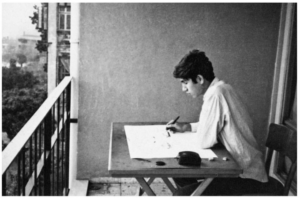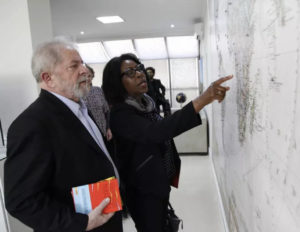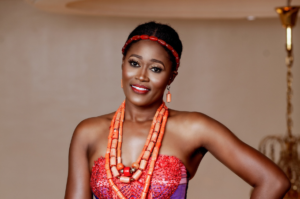
It’s 1 a.m. Eastern African Time. I’m sitting in my kitchen with my phone perched up on the table, calling Snit Tewoldemedhin, who is in Virginia, seven thousand miles from my location in Asmara, Eritrea. As soon as she picks up the phone, our animated chatter fills the quiet room, where the loudest sound is the humming of the refrigerator nearby. In Virginia, it’s still only 6 p.m., the daylight outside her window visible through the video call. Though tired from her endless responsibilities, she appears fresh-faced and upbeat and asks how her hometown is doing.
Her younger sister Milka stands behind her, affectionately playing with her long hair as we speak. Snit looks up at her with a smile and makes quick introductions. Milka waves at me enthusiastically, like we’ve always known each other, and she’s happy to see me. I watch the two of them interact for a few minutes, and even in that moment, the sisters’ bond is enviable. After all, as Snit puts it, her life’s mission is tied to this cheerful young woman she calls her “beautiful jewel,” because Milka is no ordinary 17-year-old as she was born with down syndrome.
Tewoldemedhin’s résumé is hard to believe: born and raised in Asmara, Eritrea, she only moved to the United States in 2019, where she’s evidently been thriving since. A senior Neuroscience student at George Mason University, she also works part-time as a fashion model, landing promotional video shoots for the likes of Bentley Motors Limited (yes, the Bentley), and – as if that’s not enough – she works as a part-time teacher in a Montessori school, where she is training to become a certified instructor with the necessary skills to teach children with special needs.
And as for her latest success? She is Miss Africa USA 2023 (the first Eritrean to hold the title).

This achievement put her in the spotlight among the Eritrean diaspora worldwide. As the reigning queen, she recently launched a non-profit organization, Designing for Diversity, aimed at de-stigmatizing special needs in Africa by demystifying intellectual and developmental disabilities and providing educational tools to help improve math and literacy skills among those children. Oh, and did I mention that she speaks five languages? Like I said, it’s hard to believe.
Snit laughs bashfully, her husky voice ringing in the room, when I list her achievements. “I guess I’ve been busy,” she says with a modest shrug. When I ask about her decision to compete in Miss Africa USA, she recalls, “When a friend first told me about the beauty pageant, I said I wouldn’t do it because, like almost all other beauty pageants, I thought Miss Africa USA would have a bikini contest, which I was simply not comfortable with,” she says, referencing her experience before joining (and winning) the Miss Africa USA pageantry. “But my friend assured me that this pageant was different, that it didn’t have a bikini contest, and that it genuinely strived to empower women and give them the platform and support needed to make their visions a reality. That was really important to me,” she continues firmly.
In recent years, more and more women have criticized the bikini contests that have long been a tradition in Western beauty pageants, stating that they exacerbate female sexual objectification. But for Tewoldemedhin, it was more than that: it was a matter of principle, tied to her faith and her upbringing in Eritrea’s conservative and modest culture, where even your neighbors and strangers have the prerogative to chastise you if they feel the need. This was a principle she applied to her modeling career as well. “I was always aware of the dark side of the modeling industry, so as much as I enjoyed the work, I decided early on that I was only willing to accept contracts that aligned with my values, to only collaborate with people and brands that respected the boundaries I set for myself. Yes, I wanted to be a model, and yes, I was willing to do the hard work to become established, but not at the detriment of my personal values.”
This prompted me to ask whether her ultimate goal in competing in Miss Africa USA was to boost her modeling career. She shook her head, considering her words before she spoke. “My modeling career is more of a means for a bigger picture. I love modeling and fashion, but I wanted to be more than just a model. I wanted to represent something. And I recognized that as a model, and subsequently as Miss Africa USA, I can create a platform to leverage to discuss the bigger issues I have in mind.” I waited for her to elaborate on those more significant issues, and she did so with zest. “My sister is my bigger picture. She is at the heart of many things I do, like studying neuroscience and learning to become a Montessori teacher. My purpose in life is to be an advocate for her and other people like her. That is my guiding North Star. Everything else follows suit.”
As for her decision to study neuroscience, it took a stroke of inspiration. Snit, now 24, was in her first year in college, taking various Applied Science courses, still undecided about her major, when one morning, driving from her home, she saw a Montessori school so close to where she lived. It was the first time she really paid attention to it. So, she decided to teach there part-time to learn about the Montessori pedagogy system, all for her sister’s sake. “When we first moved to the States, what with all the available resources, we thought my sister would make drastic improvements. But it wasn’t long before I noticed that she wasn’t really learning numeracy or reading skills. So, I decided to take matters into my own hands. As I started teaching her at home, I realized that trying to decipher how my sister learns invigorated me. I simply loved doing it. That’s why I chose to study Neuroscience: to get a deeper biological understanding of how the brain works and receives information, and then apply that knowledge to teach her, and ultimately, other kids like her.”

I point out how passionate she sounds when she speaks about Milka. Snit smiles fondly and replies, “How can I not? She is a gentle, loving soul.” With a chuckle, she reveals, “Just the other day, a friend of mine said to me, ‘If I dealt with people the way Milka does, I wouldn’t have problems in my love life.’ She has such a special way of touching people’s hearts; it’s uncanny. For example, when we go to the store together, she would smile widely and say genuinely sweet things like ‘Hi! I like your shoes!’ or ‘I like your outfit!’ to complete strangers – something I could never do”, Snit admitted. “I would go a long way in my social life if I were more like her.”
Something that Snit speaks about fervently is how society looks at children like Milka and focuses on what they cannot do, the things that they ‘lack’. According to her, most folks are taken aback by people with special needs simply because they haven’t been exposed to them enough. “I firmly believe these kids should be included in classrooms, not just enrolled in separate “special” classes. Regular students need to come into contact with them much more. They need to know them, play with them, and befriend them for there to be real change.” The benefits go both ways, Snit reckons: the children with special needs are in a supportive environment where they can learn (albeit with more attention from teachers) while the regular students grow up cultivating vital qualities like empathy, compassion, patience, and cooperation.
“Imagine for a second,” she says, setting a hypothetical scene, “what it would be like to have a person with special needs in your elementary classroom. You would be growing up with that kid, getting to know them, playing with them. What would happen once you grow up, got a job, and maybe even started running your own company? If you were to encounter a prospective employee with IDD, your attitude would be completely different to that of a person who maybe never spent time with someone with special needs.” It’s all about exposure, she asserts. And that exposure leads to normalization.
This is, in part, what her non-profit Designing for Diversity aims to promote. Her project, backed by the Miss Africa USA team, raises funds and organizes practical seminars targeted at school teachers and parents in various African countries. The workshops are intended to share knowledge of the Montessori pedagogy system and the materials used to better teach children with learning disabilities. “Part of Designing for Diversity is teaching about the different toys that help teach kids with special needs more effectively. For instance, there’s this one tool called the Binomial Cube. While it looks just like a toy, it’s designed in a way that prepares their minds for complex arithmetic operations. I was able to teach my sister to use it effectively, and I plan to test it on other children with special needs soon. If all goes well, we will be able to promote its use in African countries as part of the non-profit’s seminars.”
It’s well past 2 a.m., but the conversation continues to gain momentum.
Her Instagram account (@snitt_missafricaus23) displays pictures of the various events where she’s been invited to speak. In the months since her win, she’s gone on Voice of America, traveled to Seattle to speak at the Annual Eritrean Festival, where hundreds of Eritrean diaspora come together; she was invited as a guest of honor to speak at the “Experience Africa” conference at American University, Washington College of Law (in partnership with the Embassy of Eritrea) and was invited to give keynote speeches at Adal School (an Eritrean language and culture learning Center) and the Holy Spirit Catholic Church, both of which are located in Virginia.
Snit seems to have boomed in the diaspora community, becoming a role model for the young African diaspora, particularly Eritreans. I ask her how she feels about that. “Seeing the joy and excitement on those kids’ faces when I walked onstage,” she sighs, remembering her experience at the Eritrean festival in Seattle, “it was just surreal. That’s when it hit me that I’m not doing this alone anymore. I have young people in my community looking up to me, a whole country cheering me on, so I feel a strong sense of responsibility that comes with being a role model. I worry about making missteps in a way I never did before. Yet I also feel a stronger determination to move forward, make an impact, and represent.”
And what about her role models? Who does she look up to? Turns out her inspiration comes from none other than Maria Montessori herself. “I grew up knowing her name because the Italian kindergarten I attended in Asmara was named after her, but I didn’t know her backstory until a few years ago.” Maria Montessori was an Italian physician and educator who founded (you guessed it) the widely spread Montessori pedagogy system. She was also the co-director of an orthophrenic school, a medico-pedagogical institute for training teachers in educating children with cognitive disabilities. As a young woman, she attended medical school at the Sapienza University of Rome (one of the most prestigious universities in Italy) when women didn’t have a viable opportunity to pursue fields like medicine. Because it was deemed “inappropriate” by her professors, Montessori was forbidden from attending classes with the rest of her male peers when they were examining naked cadavers. But Montessori wasn’t the least bit deterred: she resorted to analyzing the naked corpses in the middle of the night with a candle.
With an infectious enthusiasm, Snit exclaimed, “Can you imagine being a young woman, going into a deserted building in the middle of the night, armed with only a candle, to examine corpses no less?! It takes a lot of courage and tenacity and speaks volumes of the kind of woman she was.” Throughout the conversation, my mind kept returning to the fact that Snit is a first-generation immigrant in the States and has only been a US resident for four years but managed to accomplish so much. When there’s a natural pause in the discussion, I voice out my observation. She smiles but points out that it hasn’t been an easy journey. “Being an immigrant means having to restart your life from scratch. I was lucky because I had the privilege of moving here with my family. And I could already speak the language fluently, so I was spared much pain. But I did still experience culture shock. I needed time to understand the culture, the social life, even the jokes. It was an isolating experience at first, but as tough as it was, I was able to use that time to work on myself and my dreams.”
I could only imagine how much work she put in to be able to study neuroscience, work as a model, teach in a Montessori school, run for Miss Africa USA, and now work on her non-profit while also having all the other day-to-day responsibilities. There seem to be many balls up in the air, and I wonder aloud how she manages to juggle all of them at once. “I do get overwhelmed sometimes. When I successfully complete a project in one area of my life, I don’t often celebrate wholeheartedly because I know that the next day, I will be working on all the other areas that I haven’t given my full attention to. But I keep going because I feel a strong sense of purpose. And on the days when I reap the benefits of my hard work, when I look back and see how far I’ve come… that joy and pride I feel makes the journey worth it.”
Snit’s candor about the realities of her relentless schedule and her work to champion her cause begs the question: who supports her? “My wonderful family, for whom I am grateful. My friends, the Miss Africa USA pageantry. There are so many people that I’m thankful for, but the Eritrean community as a whole deserves a special mention. When I got in the Miss Africa USA pageant, a friend suggested I contact one of the Eritrean YouTube channels based in the US to promote my participation and my vision. So, I contacted one particular channel, Alena Walta Hager, and they posted a video of me.” Once her interview was posted online, Eritreans all over the US caught wind of it and almost immediately started voting. For context, Snit explains how she was among the last contestants to join the pageantry. Yet, she was not only able to surpass every other contestant’s votes, she actually had double the votes of the runner-up. And it all seemed to happen overnight.
“My community was excited that I was representing Eritrea in an international competition. They all got out of their way to support me. Some people even bought tickets to Miss Africa USA just to see me, a fellow Eritrean diaspora, compete!” She pauses in reflection before continuing, “I believe I had the desired qualities to be Miss Africa, but so did all the other contestants in the pageantry. Ultimately, the tight-knit community I had supporting me set me apart. So, it’s no exaggeration to say that I won because of them.”

Shortly after, the clock on my kitchen wall strikes three, and we bid each other a good night. As I’m getting ready to sleep, my mind can’t help but connect the two-hour-long conversation to a Nguni Bantu term. Ubuntu. I am because we are. And since we are, therefore, I am.
Snit’s story epitomizes African Ubuntu philosophy: a person is a person through other people. With all her individual talents that ensured her success, she recognizes the roles of those closest to her, who help shape her, and the community that supports her. Through them, she has become the person she is: a powerful young woman driven by love for her sister, compassion for children with special needs, and connection with her community – her home away from home.










COMMENTS -
Reader Interactions